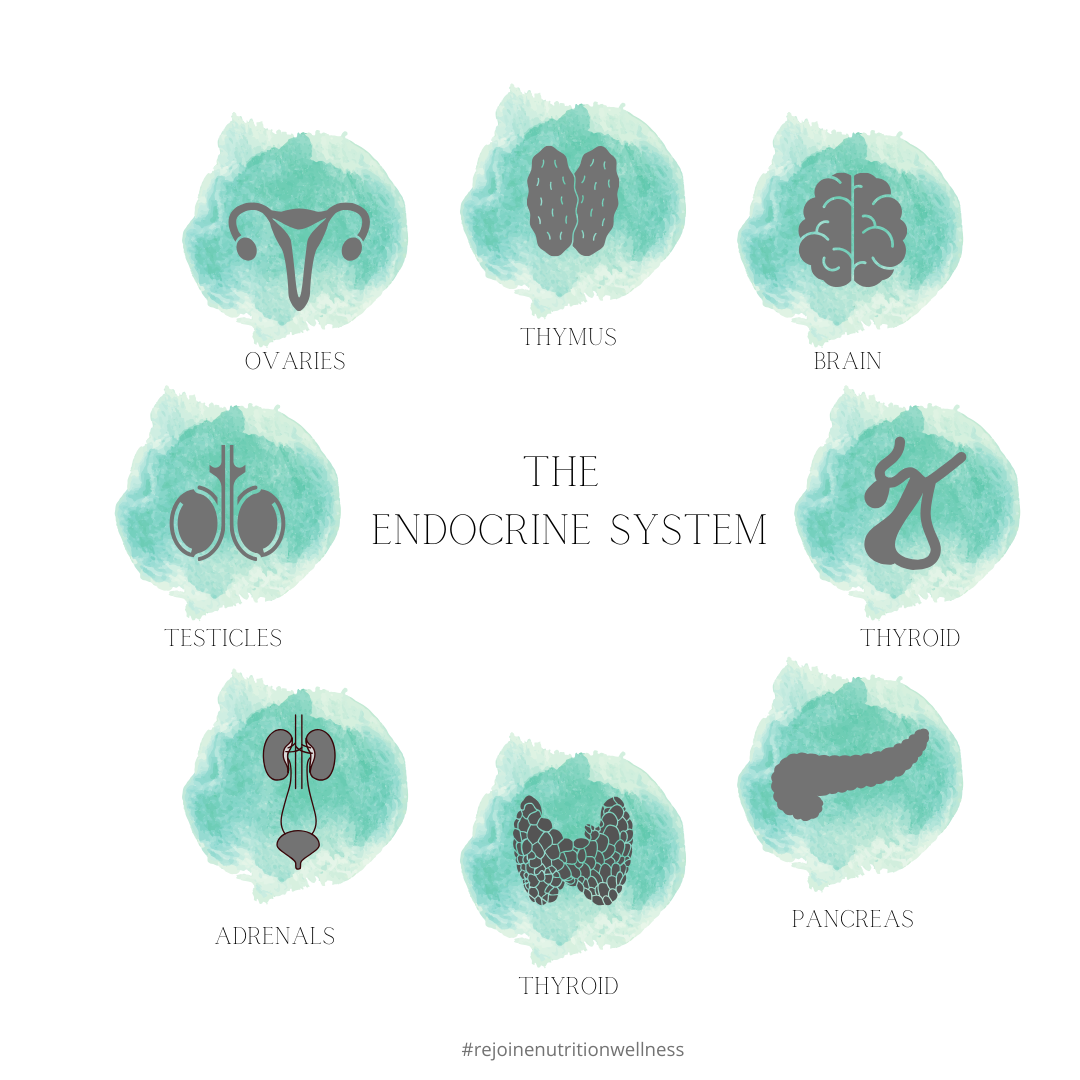Part One of our Happy Hormone Series
Alright, it’s go time! Time to dive into learning about your Endocrine System basics and how vitally important it is to keep your hormones healthy and balanced. Before we get started into our 4-week hormonal series full of resources, information, recipes, supplement discount codes, and free meal plans, I want to suggest:
- Did you read the hormonal havoc to a healthy hormone blog post from last Sunday? It is an overview of what you can expect week-to-week in this series and how to connect with me on social media platforms to generate questions and have support. Be sure you read the first blog post here, and follow Rejoice on FB or Instagram to keep up with the information.
Now that you are ready to dive into Hormone Basics 101, here is what you can expect:
-
What Systems do Hormones Regulate in the body?
-
What are the key players in the Hormone system?
-
What are some of the root Causes of Hormonal Imbalances?
-
What are some common symptoms of Hormonal imbalances?
-
How to make a Hormone Loving Salad? (you knew I was gonna toss in some food)
-
Plus, a 5 Hormone Loving Salad Recipe Ebook FREE!!! Sent to my list serve this week so be sure you signed up. If not sign-up on the home page so you don’t miss out.
1) What Systems do Hormones Regulate in the body?
Hormonal imbalances occur when there is too much or too little of a hormone in the bloodstream. Because of their essential role in the body, even the tiniest hormonal imbalance can cause side effects throughout the body and impact your quality of life.
Hormones are chemicals that are produced by glands in the endocrine system. Hormones travel through the bloodstream to the tissues and organs, delivering messages that tell the organs what to do and when to do it. Hormones are important for regulating most major bodily processes, so a hormonal imbalance can affect a wide range of bodily functions.
Men and women alike can be affected by imbalances in insulin, steroids, growth hormones, and adrenaline. Women may also experience imbalances in estrogen and progesterone levels, while men are more likely to experience imbalances in testosterone levels. The good news there are tangible things that you can do to support your Endocrine System (aka our hormones! Which we will be discussing solutions and supportive aids throughout the 4-part series.
2) What are our Key Players in the Hormone system?
Everyone will experience natural periods of hormonal imbalance or fluctuations at particular points in their life. But hormonal imbalances can also occur when the endocrine glands are not functioning properly.
Endocrine glands are specialized cells that produce, store, and release hormones into the blood. There are several endocrine glands located throughout the body that control different organs, including the:
- adrenal glands
- gonads (testis and ovaries)
- pineal gland
- pituitary gland
- hypothalamus gland
- thyroid and parathyroid glands
- pancreatic islets
3) What are the root Causes of Hormonal Imbalances?
Several medical conditions are known to impact some, or several, of the endocrine glands. Certain lifestyle habits and environmental factors may also play a role in hormonal imbalances.
Causes of hormonal imbalances include:
- chronic or extreme stress
- type 1 and type 2 diabetes
- hyperglycemia (overproduction of glucagon)
- hypoglycemia (more insulin produced than there is glucose in the blood)
- an underactive thyroid (hypothyroidism)
- overactive thyroid (hyperthyroidism)
- over- or underproduction of the parathyroid hormone
- poor diet and nutrition
- being overweight
- hormonal replacement or birth control medications
- abuse of anabolic steroid medications
- solitary thyroid nodules
- pituitary tumors
- Cushing’s syndrome (high levels of the hormone cortisol)
- Addison’s disease (low levels of cortisol and aldosterone)
- benign tumors and cysts (fluid-filled sacks) that affect the endocrine glands
- congenital adrenal hyperplasia (low levels of cortisol)
- endocrine gland injury
- severe allergic reactions or infections
- cancers that involve endocrine glands
- chemotherapy and radiation therapy
- iodine deficiency (goiters)
- hereditary pancreatitis
- Turner syndrome (females with only one functioning X chromosome)
- Prader-Willi syndrome
- anorexia
- phytoestrogens, naturally-occurring plant estrogens found in soy products
- exposure to toxins, pollutants, and endocrine-disrupting chemicals, including pesticides and herbicides
What are some common symptoms of Hormonal imbalances in Women & Men?
Women naturally experience several periods of hormonal imbalance throughout their lifetime, including during:
- puberty
- menstruation
- pregnancy, childbirth, and breast-feeding
- perimenopause, menopause, and postmenopause
Women are also at risk of developing different types of hormonal imbalance disorders than men because they have different endocrine organs and cycles.
Medical conditions causing irregular hormonal imbalances in women (which we are covering in series 3)
- polycystic ovary syndrome (PCOS)
- hormone replacement or birth control medications
- early menopause
- primary ovarian insufficiency (POI)
Symptoms of hormonal imbalances in women include:
- heavy, irregular, or painful periods
- osteoporosis (weak, brittle bones)
- hot flashes and night sweats
- vaginal dryness
- breast tenderness
- indigestion
- constipation and diarrhea
- acne during or just before menstruation
- uterine bleeding not associated with menstruation
- increased hair growth on the face, neck, chest, or back
- infertility
- weight gain
- thinning hair or hair loss
- skin tags or abnormal growths
- deepening of the voice
Men also experience natural periods of hormonal imbalance during their lifetime. Natural causes of hormonal imbalances in men include:
- puberty
- aging
Men are also at risk of developing different hormonal imbalances than women because they have different endocrine organs and cycles. Medical conditions causing hormonal imbalances in men include:
- prostate cancer
- hypogonadism (low testosterone)
Symptoms of hormonal imbalances in men include:
- reduced sex drive
- erectile dysfunction (ED)
- low sperm count
- reduced muscle mass
- reduced body hair growth
- overdevelopment of breast tissue
- breast tenderness
- osteoporosis
5) How to make a Hormone Loving Salad (you knew I was gonna toss in some food every week)
Women are discovering that irregular periods, PMS symptoms, and fluctuating hormones can be balanced out through alterations in their diet, and especially eating specific foods for each ovarian cycle phase (follicular, ovulation, and luteal).
If we think of all the additives in our foods and the science behind each ingredient we begin to understand how they can upset our hormones to such a large extent.
Returning to the basics of food has profound health benefits, rather than going down the route of expensive pharmaceuticals and hormone replacement therapy. By altering your diet, you naturally give your body a chance to heal from the inside out.
Salads are one of my favorite ways to get in high nutrients to address some health concerns at the same time.
QUALITY PROTEIN:
- -tuna
- tempeh
- salmon
- eggs
- nuts and seeds
- shredded or ground meats
- hemp seeds
COMPLEX CARBS:
- Chickpeas/legumes
- Quinoa
- Squash
- Sweet potato
HEALTHY FATS:
- avocado
- avocado or olive oil
- nuts & seeds
- chia seeds
LIVER DETOXIFYING SUPPORTIVE VEGGIES:
- dandelion greens
- arugula
- kale
- spinach
- cauliflower
- cabbage
- spouts
- herbs (cilantro, parsley, mint)
- broccoli









